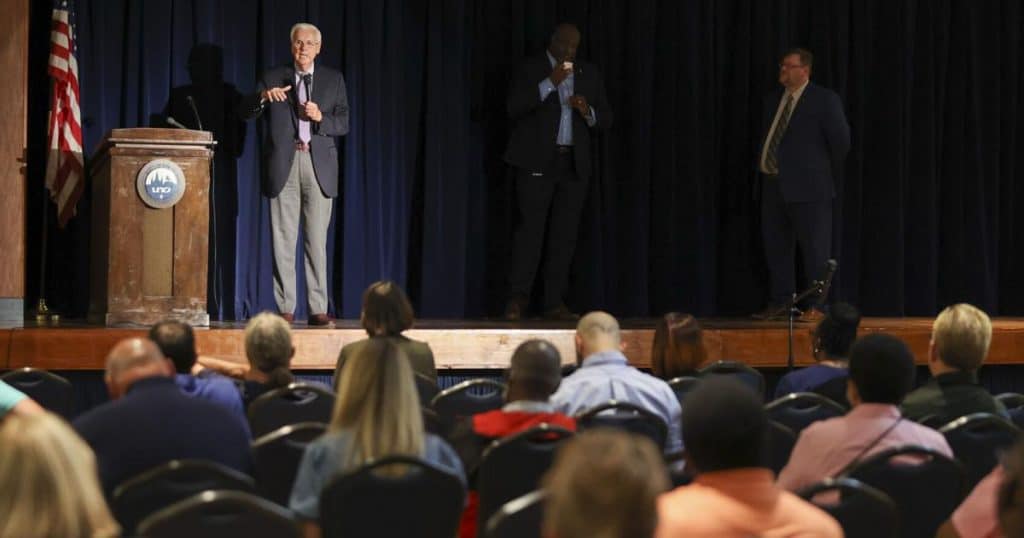Just before the calendar jumped to 2023 last week, I joined a club I didn’t really want to join. I became a customer of Louisiana Citizens Property Insurance Co., the state-run insurer of last resort.
At least I have company. At the end of last year, the Citizen rolls had risen to 129,000, with more surely on board as 2023 progresses.
My story is like that of many other people. After years of dutifully paying my former landlord’s insurer for a policy with such a high deductible that I had nothing to repair the damage from Hurricane Ida, the company announced it was abandoning Louisiana and its customers here. Citizens, who are legally required to charge above-market rates, were the only option on the table, so I signed up.
I know things could be worse. My cost increase for the year is around $1,600, which is definitely not fun but not grueling. Had I waited until January, I would have been subject to the recently approved 63% price hike for policyholders. Next year could bring even worse news, however, as Insurance Commissioner Jim Donelon has predicted a further increase if the state insurer can’t get rid of a slew of new policies it is taking on.
I bring all this up not to seek sympathy, but because I’ve long since lost count of the people I know who are in the same boat.
If it’s not you, it’s probably someone you know downstate, probably a lot of people. The big corporations, the ones that keep running those infuriating TV ads suggesting they’re actually willing to do business with viewers, are actually doing their best not to; their game is to minimize market share in hurricane-prone areas in this age of more frequent and more powerful storms. The small companies that Donelon has aggressively recruited over the years to fill the void – like my former insurer – are going bust or call it a day with alarming frequency.
It’s an existential crisis for our state, one that should get the full attention of politicians running for re-election or seeking office in the big fall elections.
I’m not sure that’s the case. It’s early days, but so far I feel like I’m hearing a lot of the same old, same old.
There is a new movement, led by State Representative and possible gubernatorial candidate Richard Nelson, R-Mandeville, to rekindle the warmed-up idea that Louisiana modest income tax, and not other high costs of living here, is the reason for emigration. Never mind that, while Texas, Florida and Tennessee have no personal income tax and are growing (they get the money to pay for services through other forms of taxation) , all other Southern states have a higher top marginal tax rate, according to the Tax Foundation. This includes places that regularly attract new residents like North Carolina and Georgia.
The corporate lobbyists start talking about insurance, but as usual they focus on lawsuits. They point to Florida’s experience rather than Louisiana’s and suggest — as they did in tort reform that promised but did not reduce auto insurance rates — that cracking down on disputes is sort of the key. They ignore, however, that lawsuits are often the only recourse for homeowners underestimated by their companies, and that increased risk exposure plays a huge role in insurers’ calculation of whether to gamble. in our market.
What we really need to hear is a plan to stop people from having their homes sold.
Donelon, a Republican and a strong proponent of the private market, is pushing for a new incentive program to attract small businesses, a project he pursued with some success after hurricanes Katrina and Rita in 2005 made run away from businesses. There is money in the state coffers to make it happen; it will be up to the Republican legislative majority to act, whether or not it philosophically agrees with public money for such a cause.
The same old talking points won’t be enough for people facing steep increases in insurance costs, from New Orleans to Lake Charles, or unable to sell because insurance for potential buyers is so high. . And that’s all on top of the higher costs of federal flood insurance imposed by FEMA’s new, opaque Risk Rating 2.0 system.
That’s what I think as a Louisiana homeowner heading into 2023, and what I’d like to hear from candidates for public office discussing.
The headlines and numbers make me think I’m far from alone.
